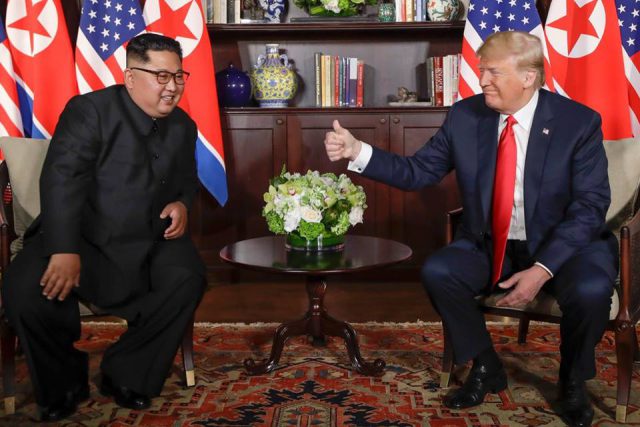
There’s a
line in Taoist philosophy that says, ‘The Tao that can be spoken is not the eternal Tao.’ It’s a cautionary principle that should underpin one’s reading of the final
joint declaration from the Trump–Kim summit in Singapore.
The declaration itself is short on detail, and commits its signatories only to four grand objectives: a new bilateral relationship between the US and North Korea, a peace regime on the Korean peninsula, complete denuclearisation of the peninsula, and recovery and repatriation of the remains of prisoners of war or soldiers missing in action from the Korean War. When it was released, the Twitterverse exploded with indignation and outrage, generally along the lines of, ‘Is that all?’
But I’d put a more positive spin on the summit—largely on the basis of what the joint declaration
doesn’t say. A close reading of the tea leaves suggests there’s more happening here than meets the public eye. Indeed, the fine detail of denuclearisation is being kept well off camera.
The two sides seem to have agreed not to talk about that issue much—not least, I suspect, because Washington believes that doing so would only make it harder for Kim Jong‑un to make the concessions necessary to make denuclearisation a practical policy option.
Readers should go back and look again at the ‘
Libyan model’ of nuclear disarmament. True, public discussion of this model became entangled with a separate event, namely Muammar al‑Qaddafi’s unseemly end. But take a closer look at the events of 2003 and 2004. Libya cooperated closely in dismantling its own WMD programs. There was a high level of transparency in that process, but only for a small group of people—it wasn’t a public process. US and British foreign and intelligence officials and International Atomic Energy Agency inspectors had the best view of what was happening on the ground. John Bolton was, at that time, Under Secretary of State for Arms Control and International Security.
Keeping the denuclearisation issue off camera in relation to North Korea clearly involves some verbal gymnastics in US descriptions of what took place at the summit. In his
hour-long press conference with media, President Donald Trump spoke of a sudden, belated, incidental agreement between the two leaders to dismantle a ballistic-missile engine test site in North Korea, suggesting that this concession had come too late to be included in the text of the joint declaration. (‘We agreed to that after the agreement was signed.’)
That’s possible, I suppose. But it would seem to fit more logically in a discussion over whether the moratorium on ballistic missile testing also included static missile engine tests—of which the North Koreans do quite a few. And that would imply both sides have begun to burrow down on matters of detail.
Trump uses the idea of the belated agreement on engine testing to suggest to journalists that not everything that was agreed appears in the declaration. ‘[W]hat we signed today was a lot of things included (sic). And then you have things that weren’t included that we got after the deal was signed.’
At later point in his press conference, Trump is asked again about the lack of detail on verifiable and irreversible denuclearisation. He replies that ‘it wasn’t a big point today because, really, this had already been taken care of, more than any other thing … This has been taken care of before we got here.’ So some points never made the declaration because they came too early.
Asked about whether American or international inspectors will actually be present on the ground to verify North Korean denuclearisation, Trump states that ‘combinations of both’ will be involved. ‘And we have talked about it, yes.’
In an
interview with George Stephanopoulos on ABC News, the president stated that ‘we have the framework of getting ready to denuclearise North Korea’. Here, he talks about denuclearisation in more sweeping terms, and the message is definitely about a process that is imminent and not distant.
So, how should we judge the Singapore summit? Well, it was definitely a public relations win for both leaders—which probably plays out to Kim’s relative advantage. Moreover, Trump’s announcement about the cessation of US–South Korean military exercises clearly caught the South Koreans flat-footed, so an awkward moment for Washington there. But on the biggest point of all, denuclearisation, the honest answer is that it’s too soon to tell. More seems to be happening than meets the eye.
 Print This Post
Print This Post